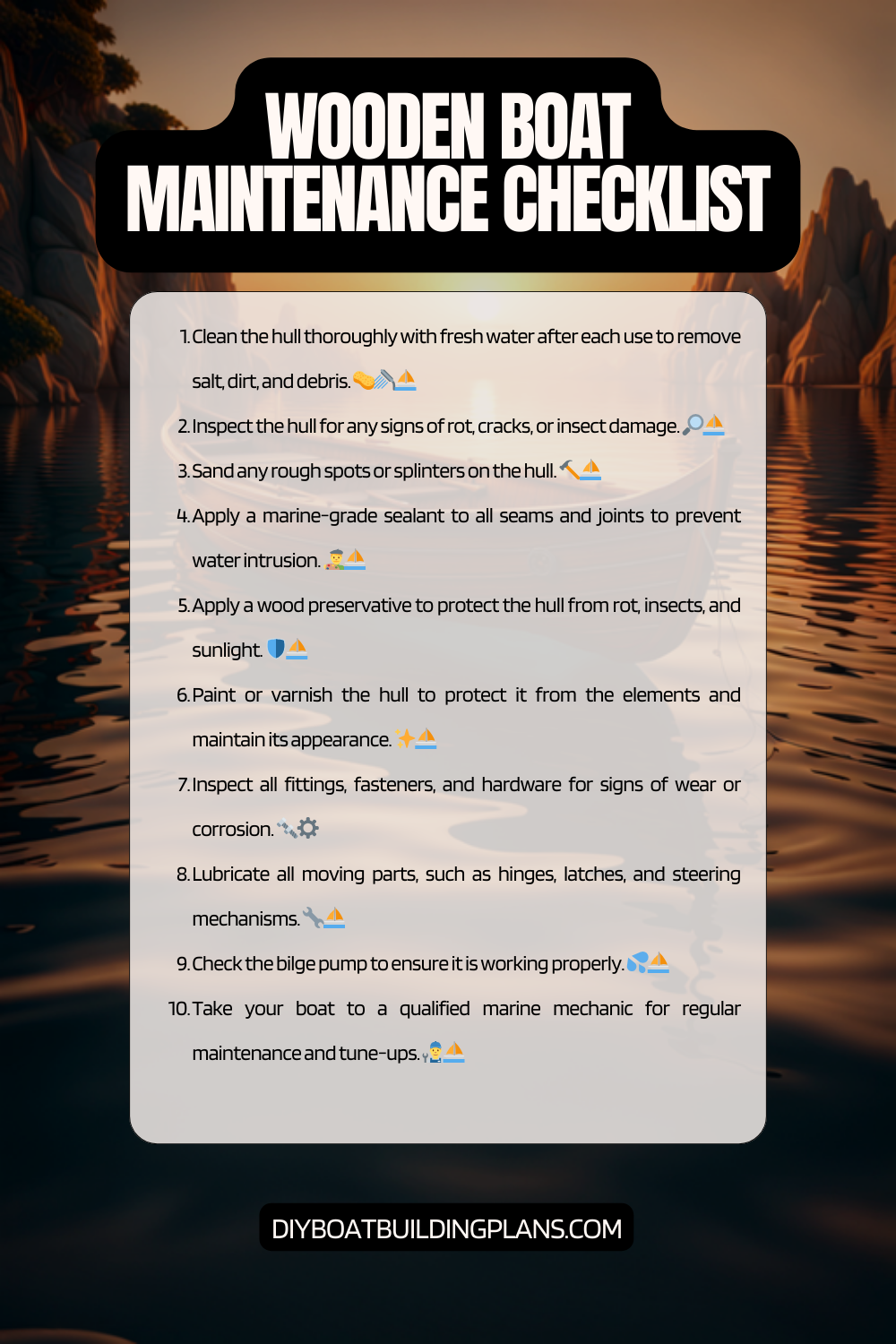Overview of Wooden Boat Maintenance Tips
Wooden boats have a timeless beauty and charm that captivates enthusiasts around the world. However, owning a wooden boat comes with the responsibility of regular maintenance to ensure its longevity and preserve its aesthetic appeal. In this article, we will explore the importance of wooden boat maintenance and provide valuable tips and insights on how to properly care for these magnificent vessels.
Key Takeaways
- Regular maintenance is crucial for the longevity of wooden boats.
- Basic tools and materials such as sandpaper, varnish, and paint are necessary for maintenance.
- Cleaning and polishing wooden surfaces can help prevent damage and decay.
- Preventing wood rot and decay requires proper ventilation and sealing.
- Professional maintenance services can help ensure the safety and longevity of wooden boats.

Importance of Regular Maintenance for Wooden Boats
Regular maintenance is crucial for wooden boats as it offers a multitude of benefits. Firstly, it helps to prevent costly repairs in the long run. By addressing minor issues promptly, you can avoid major damage that may require extensive repairs or even replacement of parts. Additionally, regular maintenance ensures that your wooden boat remains safe and seaworthy. By inspecting and maintaining the structural integrity of the boat, you can minimize the risk of accidents or failures while out on the water.
Neglecting maintenance, on the other hand, can have severe consequences. Wooden boats are susceptible to rot, decay, and damage caused by exposure to sun, water, and other elements. Without proper care, these issues can compromise the integrity of the boat’s structure, leading to leaks, instability, and even sinking. Neglecting maintenance also diminishes the aesthetic appeal of the boat, as it may develop unsightly stains, discoloration, or peeling varnish.
Basic Tools and Materials Required for Wooden Boat Maintenance
To effectively maintain a wooden boat, it is essential to have the right tools and materials at your disposal. Some basic tools include sandpaper or sanding blocks of various grits for smoothing surfaces, a paint scraper for removing old paint or varnish, a putty knife for filling cracks or holes, a caulking gun for applying sealants, and various brushes for applying paint or varnish.
In terms of materials, you will need marine-grade paints or varnishes specifically designed for wooden boats. These products offer superior protection against the harsh marine environment. Additionally, you will require sealants and adhesives suitable for wooden surfaces, such as marine-grade epoxy or polyurethane sealants. It is crucial to use the right tools and materials to ensure the longevity and effectiveness of your maintenance efforts.
Cleaning and Polishing Wooden Boat Surfaces
| Task | Frequency | Tools/Materials | Time Required |
| Cleaning wooden boat surfaces | Weekly | Soft-bristled brush, mild soap, water | 1-2 hours |
| Polishing wooden boat surfaces | Monthly | Polishing compound, soft cloth, buffing wheel | 2-3 hours |
| Removing stains from wooden boat surfaces | As needed | Stain remover, sandpaper, wood filler | Varies |
Cleaning and polishing wooden boat surfaces are essential steps in maintaining their beauty and protecting them from damage. Start by removing any loose dirt or debris using a soft brush or cloth. Next, use a mild detergent or boat soap mixed with water to gently scrub the surfaces. Avoid using harsh chemicals or abrasive cleaners that can damage the wood.
After cleaning, it is important to polish the surfaces to restore their shine and protect them from UV rays. Use a high-quality marine-grade polish or wax specifically formulated for wooden boats. Apply the polish in circular motions using a soft cloth, and then buff it off to achieve a smooth and glossy finish. Regular cleaning and polishing will not only enhance the appearance of your wooden boat but also provide a protective barrier against sun, water, and other environmental factors.
Repairing and Replacing Damaged Wooden Boat Parts
Wooden boats are prone to various types of damage, including cracks, splits, rot, and decay. It is crucial to address these issues promptly to prevent further damage and maintain the structural integrity of the boat. For minor cracks or splits, you can use marine-grade epoxy or wood filler to fill and repair the damaged areas. Sand the repaired surfaces smooth once the epoxy or filler has dried.
In cases of severe rot or decay, it may be necessary to replace damaged parts entirely. This can involve removing the affected section of wood and replacing it with new, properly treated wood. It is important to consult with a professional or experienced boat builder if you are unsure about the extent of the damage or how to properly repair or replace the affected parts.
Preventing and Treating Wood Rot and Decay
Wood rot and decay are common issues faced by wooden boat owners. These problems occur when moisture penetrates the wood, providing an ideal environment for fungi and bacteria to thrive. To prevent wood rot and decay, it is crucial to keep your boat dry and well-ventilated. Regularly inspect the boat for any signs of moisture or leaks, and promptly address them to prevent further damage.
If you notice any areas of rot or decay, it is important to treat them immediately. Start by removing the affected wood using a chisel or other suitable tools. Once the damaged wood has been removed, treat the remaining surfaces with a wood preservative or fungicide to kill any remaining fungi or bacteria. Finally, replace the damaged wood with new, properly treated wood to restore the structural integrity of the boat.
Protecting Wooden Boats from Sun and Water Damage
Wooden boats are constantly exposed to the damaging effects of sun and water. UV rays can cause the wood to fade, crack, or warp over time, while prolonged exposure to water can lead to rot, decay, and swelling. To protect your wooden boat from these elements, there are several steps you can take.
Firstly, consider applying a high-quality marine-grade varnish or paint that offers UV protection. These products create a barrier between the wood and the sun’s harmful rays, preventing damage and preserving the boat’s appearance. Additionally, ensure that your boat is properly sealed and caulked to prevent water from seeping into the wood. Regularly inspect the caulking and reapply it as needed.
Maintaining Wooden Boat Hardware and Fittings
In addition to caring for the wooden surfaces of your boat, it is important to maintain its hardware and fittings. This includes items such as cleats, hinges, fasteners, and rigging. Regularly inspect these components for signs of wear, corrosion, or damage. Replace any worn or damaged hardware promptly to ensure the safety and functionality of your boat.
To maintain the hardware and fittings, clean them regularly with a mild detergent or boat soap and water. Use a soft brush or cloth to remove any dirt or debris. Additionally, lubricate moving parts with a suitable marine-grade lubricant to prevent rust and ensure smooth operation. Regular maintenance of the hardware and fittings will extend their lifespan and contribute to the overall performance of your wooden boat.
Winterizing Wooden Boats for Off-Season Storage
If you live in an area with cold winters or plan to store your wooden boat for an extended period, it is important to properly winterize it. Winterizing involves a series of steps to protect the boat from freezing temperatures, moisture, and other potential damage during the off-season.
Start by thoroughly cleaning and drying the boat to remove any dirt, salt, or debris that could cause corrosion or damage over time. Next, apply a protective coat of wax or polish to the surfaces to provide an additional barrier against moisture and UV rays. It is also important to drain all water from the boat’s systems, including the engine, plumbing, and bilge.
Covering your wooden boat with a high-quality, breathable boat cover is essential for protecting it from snow, ice, and other elements during storage. Ensure that the cover is properly secured and that there is adequate ventilation to prevent condensation and mold growth.
Download over 500 Boat Plans. Click on the link below.
-->Click Here<--
Hiring Professional Wooden Boat Maintenance Services
While many aspects of wooden boat maintenance can be done by owners themselves, there are times when it is necessary to seek professional assistance. If you are unsure about how to address a specific issue or lack the necessary skills or tools, it is best to consult with a professional wooden boat maintenance service.
When hiring a professional, look for experience and expertise in working with wooden boats. They should have a thorough understanding of the unique challenges and requirements of wooden boat maintenance. Additionally, ensure that they use high-quality materials and follow industry best practices to ensure the longevity and integrity of your boat.
Wooden Boat Maintenance Checklist

Conclusion – Wooden Boat Maintenance Tips
In conclusion, maintaining a wooden boat is essential for its longevity, safety, and aesthetic appeal. Regular maintenance, including cleaning, polishing, repairing, and protecting, will help to prevent costly repairs and ensure that your boat remains in optimal condition. By using the right tools, materials, and techniques, you can effectively care for your wooden boat and enjoy many years of sailing pleasure. Remember, the key to successful wooden boat maintenance is consistency and attention to detail.
FAQs – Wooden Boat Maintenance Tips
What is wooden boat maintenance?
Wooden boat maintenance refers to the regular upkeep and repair of a wooden boat to ensure its longevity and seaworthiness.
Why is wooden boat maintenance important?
Wooden boats are susceptible to rot, decay, and damage from the elements. Regular maintenance helps prevent these issues and ensures the boat remains safe and functional.
What are some common wooden boat maintenance tasks?
Common wooden boat maintenance tasks include cleaning, sanding, varnishing, painting, caulking, and repairing any damage or rot.
How often should I perform wooden boat maintenance?
The frequency of wooden boat maintenance depends on the boat’s usage and exposure to the elements. However, it is recommended to perform maintenance tasks at least once a year.
What tools and materials do I need for wooden boat maintenance?
Tools and materials needed for wooden boat maintenance include sandpaper, paintbrushes, varnish, paint, caulking, wood filler, and a variety of hand tools such as hammers, chisels, and saws.
Can I perform wooden boat maintenance myself?
Yes, wooden boat maintenance can be performed by boat owners themselves. However, it is important to have a basic understanding of the necessary tasks and techniques to ensure the boat is properly maintained.
What are some tips for maintaining a wooden boat?
Some tips for maintaining a wooden boat include keeping it clean and dry, inspecting it regularly for damage or rot, using high-quality materials for repairs, and storing it properly when not in use.



